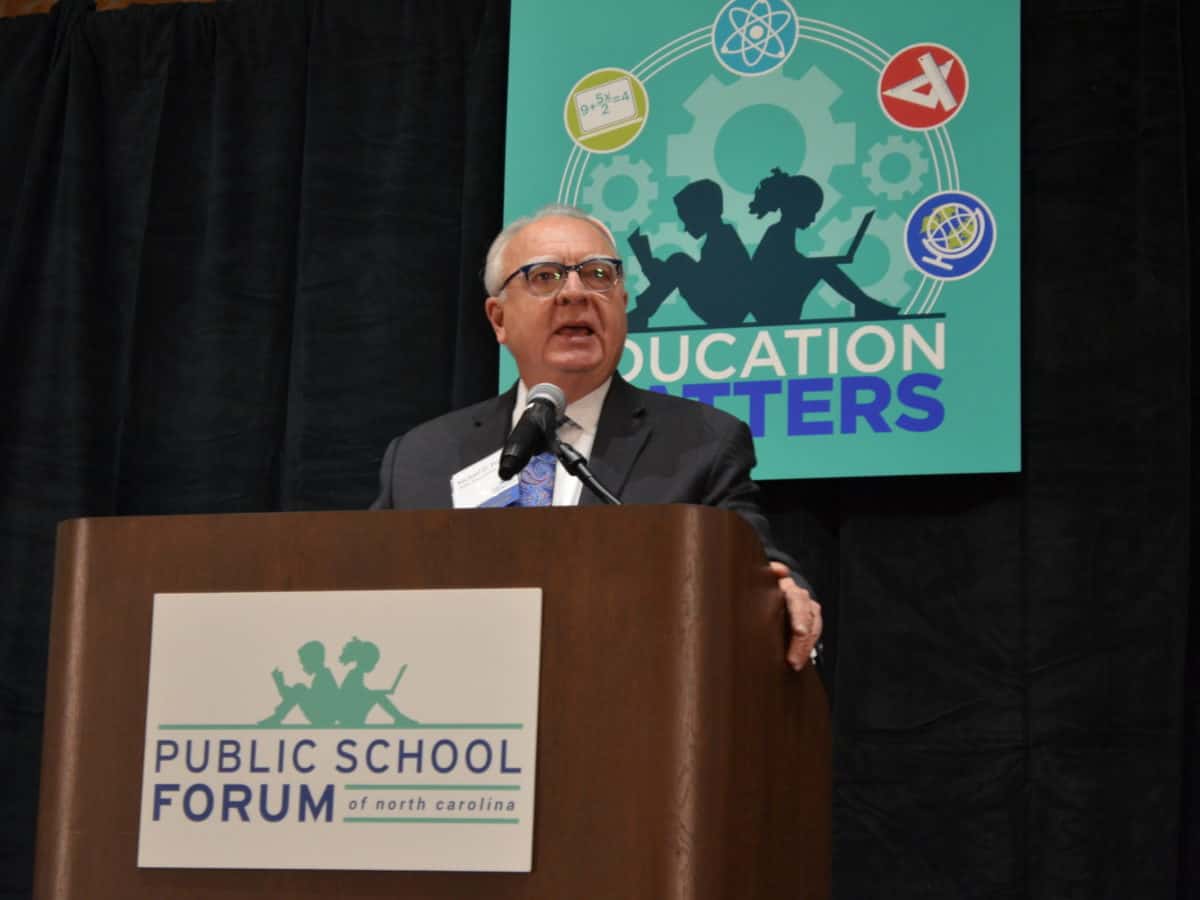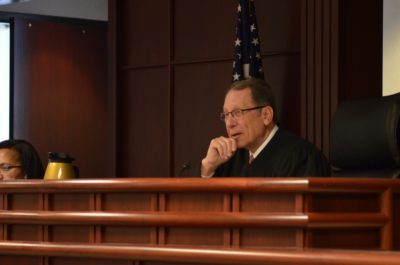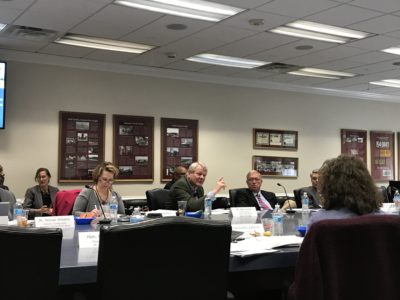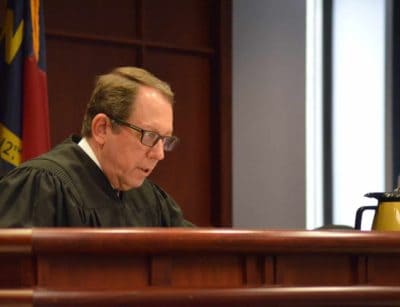

Breaking with a long-standing tradition, the Public School Forum of North Carolina eschewed its traditional top 10 issues of the year today in favor of just one for 2020: Leandro.
Every year, the Forum holds an Eggs & Issues event in which it releases its top 10 educational issues for the current year, but with the introduction of the WestEd report on Leandro last year as well as a consent order from Judge David Lee in the case, the Forum decided that Leandro encompasses multiple issues it has highlighted in the past.
“The urgent need to finally provide equitable educational opportunities to our students should be heeded by all, regardless of political party, and demands a dedicated, collaborative effort,” said Acting President/Executive Director of the Public School Forum, Dr. Michael D. Priddy, in a press release. “As we approach a year that we believe historians will look back on as pivotal when it comes to our system of K-12 public education, this year our Top Education Issues list has been distilled into this one driving issue, which is to act in an intentional and expeditious way to bring our state into Leandro compliance.”
More specifically, the top issue is: Take Immediate and Intentional Actions to Meet Our Constitutional Obligation to Provide Each Child a Sound Basic Education.
The Leandro case started in 1994 when families from five low-wealth counties sued the state, claiming North Carolina was not providing their kids with the same educational opportunities as students in higher-income districts. In 1997, the state Supreme Court ruled unanimously in the case that the state’s children have a fundamental right to the “opportunity to receive a sound basic education.” A later state Supreme Court opinion agreed with a lower court that North Carolina had not lived up to that constitutional requirement for every student.
For much of its history, the Leandro case was overseen by Judge Howard Manning, who held numerous hearings in an effort to determine how the state could meet its constitutional obligation. In October 2016, he requested to be removed from the case, and Chief Justice Mark Martin reassigned it to Emergency Superior Court Judge David Lee. According to the consent order, in his last order in March 2015, Manning said that “a definite plan of action is still necessary to meet the requirements and duties of the state of North Carolina with regard to its children having equal opportunity to obtain a sound basic education.”
Both sides in the Leandro case agreed back in 2017 that an independent consultant should be chosen to make recommendations on how the state can ensure quality education for every North Carolina child.
That consultant was WestEd, and the organization released a report in late 2019 that laid out how the state can ensure that all students in North Carolina have the opportunity for a “sound basic education.”
A consent order followed, signed by Judge Lee, that lays out the general agreement of all parties as to the facts of the case, the findings and recommendations of the WestEd report, and the need to do something further to meet the Leandro mandates. It also establishes a plan for the parties to present further reports detailing concrete steps the state will take to meet the short-, middle-, and long-term recommendations of the WestEd report.
During the Eggs & Issues event today, Priddy and Lauren Fox, senior director of policy at the Public School Forum, ticked through the five priorities that follow from its primary issue of 2020. They are:
- KEY PRIORITY ONE: Redesign our School Finance System to Dramatically Improve Adequacy, Equity, and Flexibility.
- KEY PRIORITY TWO: Overhaul Educator Compensation, Recruitment, and Professional Development Strategies.
- KEY PRIORITY THREE: Revamp Our School Accountability Model: Eliminate or Revise the A-F School Grading System.
- KEY PRIORITY FOUR: Support a Major State Investment to Fully Fund North Carolina’s $8 Billion+ School Infrastructure Needs.
- KEY PRIORITY FIVE: Establish a Plan to Monitor Progress toward Leandro Compliance.
On the first priority, Fox said that when you go back to school finance studies from decades ago, the problems inherent in the education system then remain today. Along with the release of its top issue of 2020, the Forum also released its latest school finance study today. Fox said that per-pupil spending in North Carolina has declined by about 6% since 2009-2010 when adjusted for inflation.
“We believe we can do a lot better and we must do a lot better than we currently are,” she said.
Fox pointed out how difference in property values between various counties contribute to inequities in how much money local school districts have to contribute to their students. In high-wealth districts, students have access to far more resources than low-wealth ones.
She said that in 2017-19, there was a gap of a little over $2,200 dollar in local spending per student between the 10 wealthiest and 10 poorest counties in the state, even though the poorer counties taxed themselves at far higher rates to try to make up the difference.
“This gap has grown substantially since the early years of the Leandro case,” Fox said.
In addition, more restrictions on how districts can spend state funding for education makes it harder for education leaders to target their spending in the right places. That was one no-cost thing Fox said the General Assembly could do immediately: increase spending flexibility for districts.
For priority two, Fox talked about how teachers are the best predictors of student outcomes, yet the state has a shrinking teacher pipeline and a decline in effective teachers across the state. In addition, she said that teachers are increasingly not representative of the students they’re teaching, many of whom are students of color.
She said that teacher pay in North Carolina lags behind other states while lawmakers have eliminated things like master’s pay, longevity pay, and retirement health benefits for new teachers.
“We encourage our state leaders to begin working to reinstate supports,” she said.
Priddy and Fox also discussed the remaining three priorities, talking about the need to monitor progress with Leandro compliance, eliminate or revamp the state’s A-F grading system for schools, and come up with money to meet the state’s estimated more-than $8 billion need for school construction — whether through a bond or a pay-as-you-go plan.
“There were six successful public school bond referendums between 1949 and 2000, yet it’s been over 20 years since the citizens of North Carolina have had the opportunity to show their support for school building construction,” Priddy said.
After the issues were presented, a panel discussed the importance of Leandro to North Carolina. Panelists were:
- Ann McColl, an education attorney, constitutional scholar and Co-Founder and President of The Innovation Project (TIP).
- Dr. Anthony Jackson, North Carolina Superintendent of the Year, Vance County Schools.
- Thomas B. Oxholm, Vice President of Finance & Administration, Wake Stone Corporation.
- Alan Duncan, Vice Chairman, NC State Board of Education.
McColl said that the history of Leandro shows a change in the situation with regards to school finances. Once upon a time, additional education funding went from a “might” to a “must.”
“Sufficiency of funding has gone from behind the scenes of something that might be needed to now the order says that additional funding is needed,” she said.
Jackson said that the WestEd report and Leandro consent order represent a rare moment in North Carolina history.
“I am hopeful that we will take this opportunity to really grab a hold of the moral imperative and do what’s right for children,” he said.
Duncan said that making sure every child in North Carolina has access to a sound basic education is imperative.
“It is a constitutional imperative. It’s an economic imperative. It’s a moral imperative,” he said.
And Oxholm talked about the need for the K-12 system to anticipate needs for the future. For instance, he said that in 20 years, truck drivers will be out of a job as trucks begin to drive automatically.
“What are we doing as a school system in this state to prepare for the changes that are coming?” he asked.







